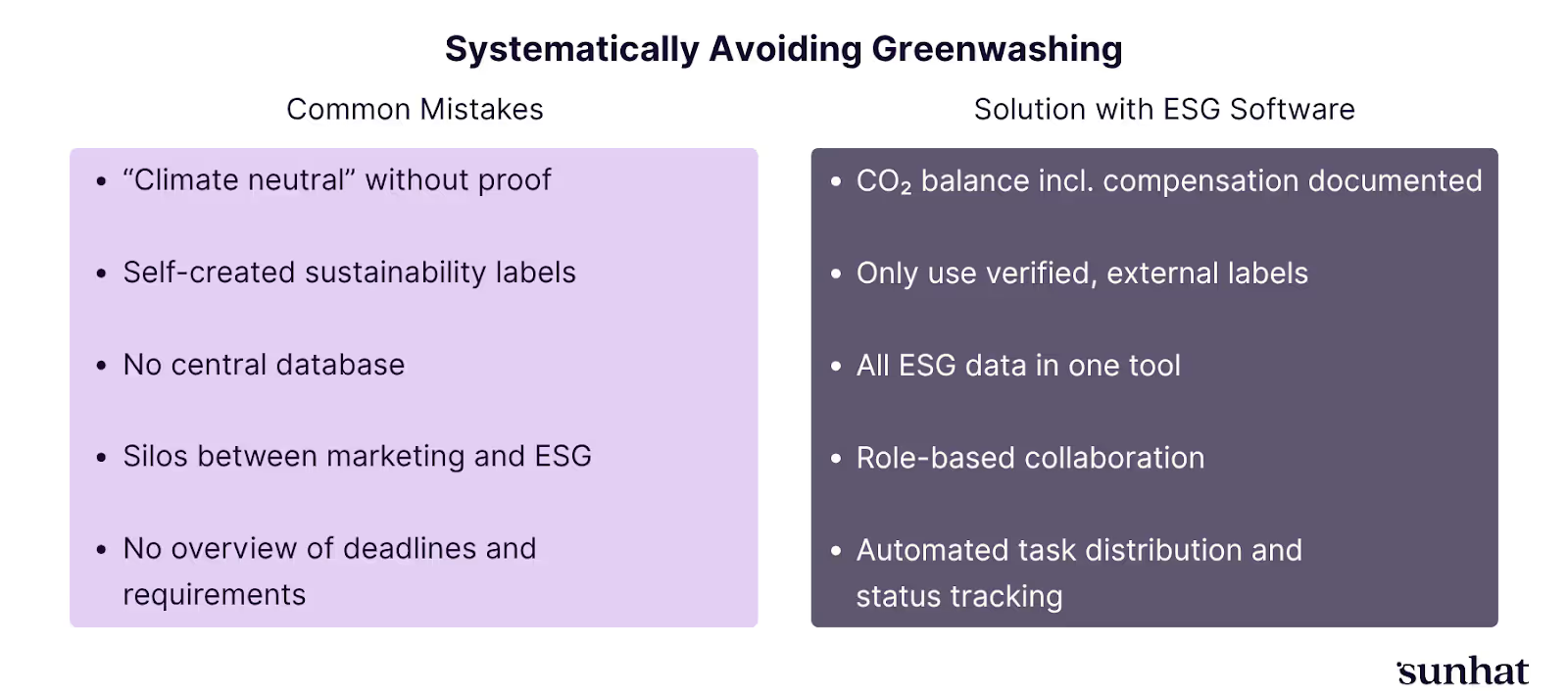Latest update July 23, 2025
[cg_add-class=heading-style-h4]In a Nutshell
- The Green Claims Directive was stopped politically, but the EmpCo Directive will be implemented as mandatory law starting in 2026.
- EmpCo prohibits blanket environmental promises without verifiable ESG data and creates clear rules against greenwashing.
- In the future, marketing and communications must make verifiable statements based on reliable ESG data.
- With AI-supported ESG software, sustainability, legal, and marketing teams can work together efficiently and avoid compliance risks
- Sunhat centralizes, documents, and structures ESG data for fact-based, compliant communication
The Green Claims Directive was supposed to establish clear rules for environmental claims. However, it has recently become apparent that the final round of negotiations has been canceled. The EU Commission has not finalized the legislative proposal as planned. This has created uncertainty, not only in marketing departments but also among sustainability managers.
If there is no clear EU-wide regulation, does that mean anything goes again? Quite the contrary. With the Empowering Consumers Directive (EmpCo), a binding EU directive will come into force in 2026 that is specifically designed to prevent greenwashing.
In the future, companies will have to prove what they say about their environmental impact. And that is precisely why structured, auditable ESG data is needed.
What Does the Rejection of the Green Claims Directive Mean?
The Green Claims Directive was intended to oblige companies to scientifically substantiate environmental claims using recognized methods, third-party verification, and standardized evidence. Terms such as “climate neutral,” “environmentally friendly,” or “sustainably produced” would then only have been allowed to be used if these statements were backed up by concrete, verifiable ESG data.
No political agreement was reached. Small and medium-sized enterprises (SMEs) in particular had concerns about the bureaucratic burden. At present, it looks as though the Green Claims Directive will not be adopted.
Nevertheless, the obligation to provide verifiable sustainability communication remains in place – through EmpCo.
What Does the Directive on Strengthening Consumer Rights Regulate?
Unlike the Green Claims Directive, EmpCo has already been adopted. It will be implemented in all EU member states by September 2026 at the latest. The key requirements are as follows:
- Prohibition of unspecific environmental claims: Terms such as “green,” “environmentally friendly,” “climate neutral,” or “CO₂-compensated” may only be used if they are backed up by data.
- Ban on self-created sustainability labels: Companies may not develop their own seals or symbols that suggest sustainability without objective testing criteria.
- Transparency requirements: Customers must be able to understand how an environmental claim is made.
In short: Marketing and communication may no longer make claims that are not documented internally with data.
Why ESG Data is Now Becoming a Prerequisite for Marketing
For sustainability teams, this means that the ESG department can no longer see itself as a pure reporting team. Its data increasingly forms the basis for strategic marketing, product communication, and external credibility.
This development primarily affects companies that actively advertise their sustainability performance – for example, in the following areas:
- Company website
- Packaging design
- Sustainability reports
- Tenders (e.g., with EcoVadis or CDP)
- Employer branding
- PR and media relations
Wherever statements about environmental impacts are made, structured ESG data must be available in the future – including sources, key figures, and validity periods.
Challenge: ESG Teams Do Not Have the Capacity for Constant Coordination with Marketing
The reality is often different. Sustainability teams are already busy with:
- Sustainability measures such as water targets or decarbonization
- CSRD reporting
- Supply chain due diligence
- Customer questionnaires including EcoVadis and CDP
In addition, it is hardly feasible to regularly provide marketing with figures, evidence, and wording. This is precisely why a structured approach is needed.
The Solution: Collect ESG Data in a Structured Manner and Make it Available Across Teams
Professional ESG data management, for example in the form of AI-supported software such as Sunhat, provides a remedy here.
The most important advantages:
1. Central platform for all ESG data
- All data, such as evidence, documents, emission figures, and action reports, in one place.
- Every ESG-relevant claim can be linked to supporting documents.
2. Smooth collaboration with other teams
- Marketing, legal, and product development can access verified ESG data in a targeted manner.
- Role-specific access facilitates collaboration without data protection risks.
3. More efficient ESG reporting
- The structured database also facilitates the processing of ESG ratings such as EcoVadis or CDP.
- Duplicate work is avoided.
4. Verifiable communication with substance
- Every statement about sustainability is based on concrete, verifiable information – exactly as required by EmpCo.

Conclusion: Sustainable Marketing Starts with a Good Database
Greenwashing will no longer be tolerated in the future. And that's a good thing. The new EU regulation requires companies to deliver substance. Anyone who makes environmental promises must be able to back them up. Sustainability managers are increasingly taking on an interface function for external communication.
The key lies in the right infrastructure:
- Collect ESG data in a structured manner
- Enable collaboration
- Make documents available at any time
AI-powered ESG software such as Sunhat helps to create precisely this foundation – efficiently, collaboratively, and in compliance with regulations.
Stop scrambling. Start proving.
Your next customer questionnaire, assessment, or audit doesn't have to be a fire drill. Get the platform that keeps proof ready for every request.

The Green Claims Directive was intended to establish strict requirements for environmental claims, including mandatory verification by independent bodies. Its focus was on verifiable statements and standardized sustainability labels. The EmpCo Directive, on the other hand, has already been adopted and will come into force in 2026. It prohibits blanket environmental claims such as “environmentally friendly” or “climate neutral” if they cannot be substantiated and prohibits self-created sustainability labels. Both sets of regulations aim to prevent greenwashing – but EmpCo is already binding.
For compliant sustainability communication, companies need structured ESG data such as CO₂ balances, life cycle analyses, information on energy and resource consumption, supply chain information, and evidence of certifications and measures. This data must be up-to-date, traceable, and auditable. This is especially true when statements such as “climate-neutral production” or “sustainable supply chain” are used. ESG software helps to centrally collect this data and make it available for marketing, reporting, or audits.
ESG software such as Sunhat enables the central collection, validation, and documentation of all relevant ESG data within a company. It creates transparency, reduces sources of error, and facilitates cross-team collaboration – for example, between sustainability management, legal, and marketing. This allows environmental promises to be backed up with clear evidence. This not only minimizes the risk of greenwashing, but also facilitates ESG ratings such as EcoVadis or CDP.






.avif)


%201.svg)






